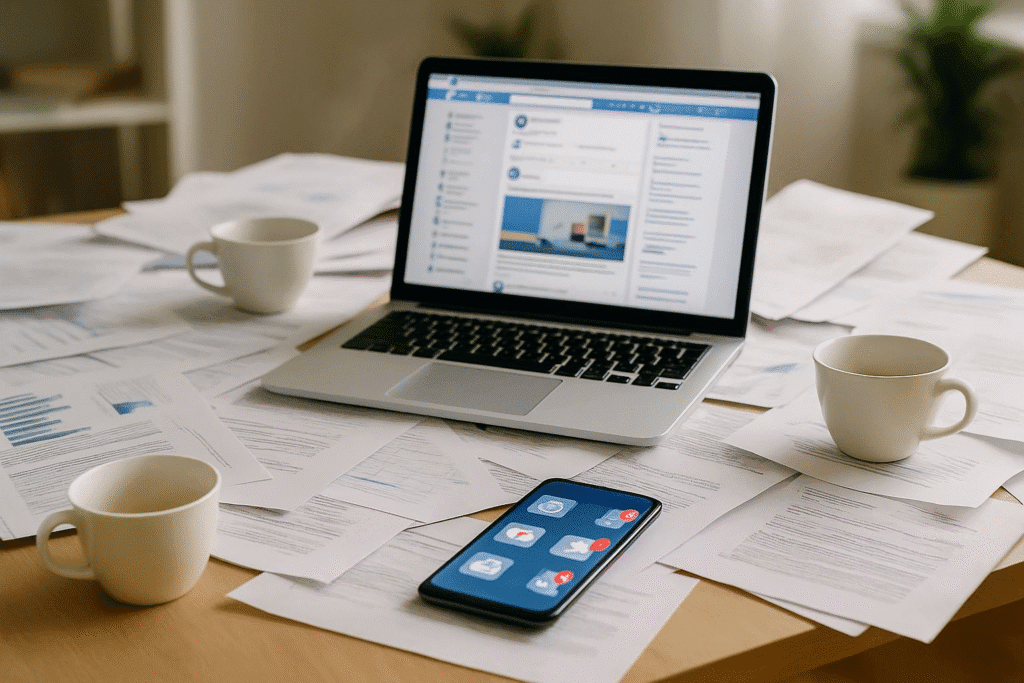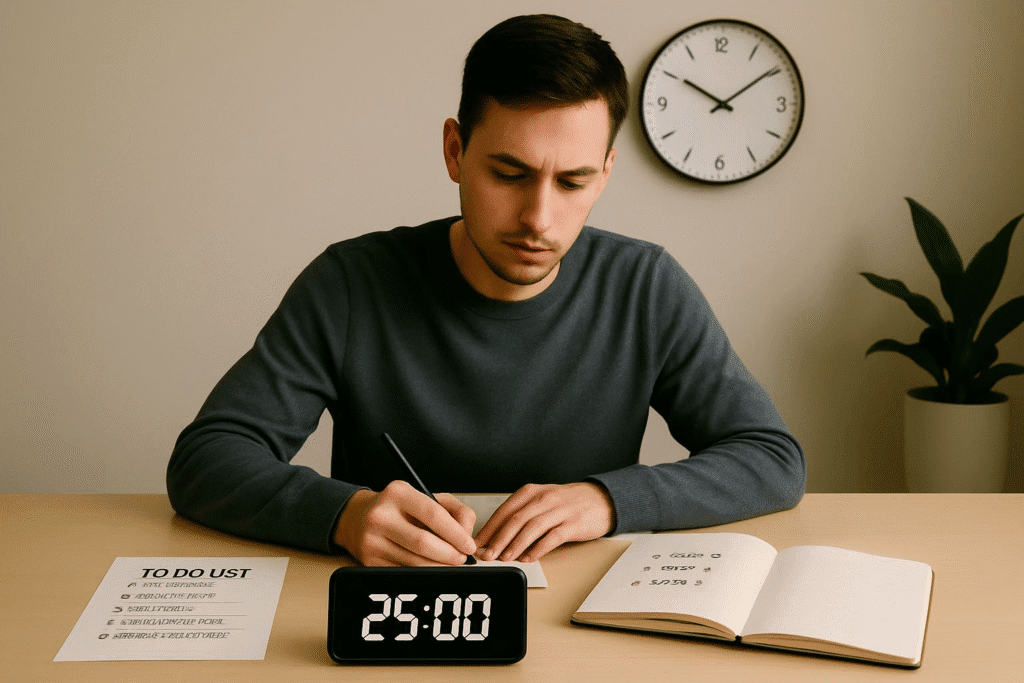Introduction

You’re not losing focus — it’s being stolen.
You’ve tried to work, tried to study, and yet… your mind keeps wandering. You can’t seem to get into the flow anymore, no matter how hard you try.
The truth is, you’re not lazy — your brain is fighting against you. Modern distractions are hijacking your attention in ways that are designed to keep you from focusing. And they’re winning.
If you’ve ever wondered why it feels so impossible to stay focused for more than a few minutes at a time, this blog is for you. In the next few sections, I’ll break down why your brain feels foggy and give you practical, science-backed solutions to get your focus back — fast.
🧠 The Real Reason You Can’t Focus
It’s not you — it’s them.
Your brain isn’t broken, but it’s being hijacked. Every notification, every scroll, every ping is designed to steal your attention and keep you from focusing on anything meaningful.
Here’s the truth: Your focus is the product of an attention economy. The apps you use, the websites you visit, and the media you consume are engineered to keep you scrolling.
- Social media: Infinite scroll is a dopamine trap. Every swipe promises something new and exciting, and your brain can’t resist it.
- Notifications: Those little red bubbles are built to trigger anxiety — they make you feel like you’re missing something important, even when you’re not.
- Endless content: The autoplay feature on YouTube, the “next episode” button on Netflix — they’re designed to keep you engaged without thinking.
All of this rewards short bursts of attention, but it kills your ability to focus on longer, more meaningful tasks. Over time, you start feeling “brain fog” even when you’re not tired, and your productivity drops.
The more your brain is trained to chase instant rewards, the harder it becomes to focus on long-term goals or deep work.
It’s not your fault — it’s just how your brain is being rewired by the digital world.
🧠 The Hidden Damage of Distraction
Distraction doesn’t just waste your time — it rewires your brain.
Every time you interrupt your focus with a notification or a new tab, your brain undergoes a small, invisible shift. It’s like a muscle you’re training — but the more you give in to distractions, the weaker your ability to focus becomes.
Here’s the hidden damage:
- Reduced attention span: Constant distractions lead to shorter attention spans. Studies show that the average human attention span has dropped by nearly 25% in the past decade.
- Mental fatigue: Constant switching between tasks tires your brain, leading to cognitive overload. This makes it harder to stay productive, even when you’re not doing anything taxing.
- Increased stress: The constant need to check notifications and be “on” can elevate your stress levels. It feels like you need to be plugged in, and that pressure builds up over time.
This isn’t just a productivity problem — it’s a mental health problem. The more you allow distractions to rule your day, the more likely you are to experience burnout and anxiety.
3 Big Focus Killers You Don’t Realize

Your focus isn’t just weakened by distractions. It’s actively sabotaged by hidden forces.
Here are three silent killers of focus that you may not even notice — but they’re doing serious damage to your productivity.
1. Task Switching (Multitasking)
You think you’re being productive by juggling tasks, but science shows you’re actually sabotaging your brain. When you jump from one task to another, your brain takes time to reorient itself — wasting energy and lowering focus.
The result:
- Lower IQ during multitasking.
- Higher chances of making mistakes.
- Slower overall productivity.
2. Digital Overload
We’re consuming too much digital content. Your mind can’t process endless information from news, emails, social media, and podcasts without it taking a toll.
The result:
- Information fatigue.
- Difficulty filtering out what’s important.
- A scattered, unfocused mind.
3. Chronic Stress & Anxiety
Being “on” all the time — checking your phone, emails, social media — triggers your body’s stress response. This can put you in fight-or-flight mode, which makes deep work and creative thinking nearly impossible.
The result:
- High cortisol levels, which block focus and creativity.
- Constant mental chatter, making it difficult to concentrate.
- Lack of motivation to dive into challenging tasks.
Reclaim Your Focus — Do This First
Before you dive into “focus hacks,” let’s tackle the root of the issue.
If you want to regain your ability to focus, start with this simple, yet powerful step: detox from distractions.
Here’s how you can begin:
1. Turn Off Non-Essential Notifications
- No more constant pings. Set your phone to “Do Not Disturb” or mute apps like social media and email for a few hours.
- Tip: You don’t need to be “on” 24/7. Block time for focused work and for breaks.
2. Set a Daily “Focus Time”
- Choose 2-3 hours per day dedicated solely to one task, with no interruptions.
- Tip: Use tools like “Pomodoro” (25-minute intervals) to keep your focus sharp.
3. Declutter Your Digital and Physical Workspace
- A messy desk or a cluttered phone screen can trigger distraction. Clean your workspace and organize your digital files.
- Tip: Use productivity apps like Notion or Trello to stay organized.
By setting these boundaries and eliminating distractions, you create the space for your brain to get back to deep, focused work.
💡 Actionable Tips That Actually Work

Ready to get back on track?
Here are practical, no-nonsense tips you can apply right now to improve your focus.
1. Use the 2-Minute Rule
- If a task will take less than 2 minutes, do it immediately.
- Tip: This clears small tasks off your plate quickly, preventing them from piling up and draining your attention.
2. Practice Deep Work
- Set aside a specific time each day for “deep work” — tasks that require undivided attention (e.g., writing, coding, creating).
- Tip: Start with 1 hour a day and gradually increase it. Treat this time like an important meeting you cannot cancel.
3. Take Regular Breaks
- The Pomodoro Technique is perfect for this: 25 minutes of focused work, then 5 minutes of rest.
- Tip: After 4 cycles, take a longer break (15-30 minutes). This keeps your mind fresh and prevents burnout.
4. Block Social Media and Apps
- Use website blockers (like StayFocusd or Freedom) to block distracting websites during focus time.
- Tip: Set app time limits on your phone using built-in features (Screen Time on iPhone, Digital Wellbeing on Android).
5. Prioritize Tasks (Eat the Frog)
- Tackle the hardest or most important task first thing in the morning, when your focus is at its peak.
- Tip: Write down your 3 most important tasks the night before and focus only on them the next day.
These tips are simple to implement but extremely powerful when used consistently. Focus is a muscle — the more you train it, the stronger it becomes.
Conclusion: Take Control of Your Focus
Focus isn’t a gift — it’s a skill.
In today’s world, distractions are everywhere, constantly pulling you in different directions. But here’s the good news: you have the power to reclaim your focus.
By understanding the science behind attention, setting boundaries, and implementing these actionable strategies, you can stop your focus from slipping away. Remember, focus isn’t just about cutting out distractions — it’s about creating an environment that nurtures deep work and clarity.
Here’s your final takeaway: Start small. Implement one strategy at a time. You don’t have to change everything at once. But by taking consistent action, you’ll gradually see your ability to focus improve, and your productivity will soar.
Don’t let distractions rule your life. Reclaim your focus, and start achieving more of what really matters.
Amazon Recommendations: Must-Read Books on Focus and Productivity
If you want to dive deeper into mastering your focus and productivity, these books are your best tools. Each one offers powerful insights and actionable steps to help you stay on track and accomplish more.
1. “Deep Work: Rules for Focused Success in a Distracted World” by Cal Newport
In this book, Cal Newport argues that deep work — the ability to focus without distraction on cognitively demanding tasks — is becoming increasingly rare. He shares practical advice on how to cultivate deep work in your life and why it’s essential for success.
2. “Atomic Habits: An Easy & Proven Way to Build Good Habits & Break Bad Ones” by James Clear
James Clear’s best-seller focuses on how small, incremental habits can compound into massive results. This book is perfect if you want to improve your focus by developing powerful habits that set you up for long-term success.
3. “The One Thing: The Surprisingly Simple Truth Behind Extraordinary Results” by Gary Keller & Jay Papasan
This book teaches you the power of focusing on the one thing that matters most in any area of your life. By focusing on what truly drives results, you can achieve extraordinary success without feeling overwhelmed by endless tasks.
4. “Make Time: How to Focus on What Matters Every Day” by Jake Knapp & John Zeratsky
This book is packed with practical techniques for managing your time and focus. It helps you design your day around what truly matters, minimizing distractions and maximizing your most productive hours.
5. “Indistractable: How to Control Your Attention and Choose Your Life” by Nir Eyal
Nir Eyal provides a comprehensive guide to mastering your attention in a world filled with distractions. He explores the psychology of distraction and offers actionable strategies to regain control of your focus and live a more intentional life.
FAQ’s
How can I stop myself from getting distracted at work?
Set clear boundaries by blocking distracting apps or websites, and create a designated work environment. Try the Pomodoro technique, working in 25-minute intervals with short breaks. Consistency is key!
Is multitasking really that bad?
Yes, multitasking reduces productivity. Your brain switches between tasks, causing cognitive fatigue. Stick to one task at a time for more efficient work.
How can I improve my focus if I have ADHD?
Use tools like timers and task management apps to break tasks into smaller steps. Also, try incorporating regular breaks to avoid burnout and keep your brain engaged.
How can I stay focused while working from home?
Establish a clear work routine and separate your workspace from other areas of your home. Eliminate distractions by turning off notifications and setting dedicated focus times.
How long does it take to build focus?
It depends on consistency and effort. It can take anywhere from a few weeks to a few months to train your brain to focus for longer periods. Start with small steps and gradually increase your focus time.
